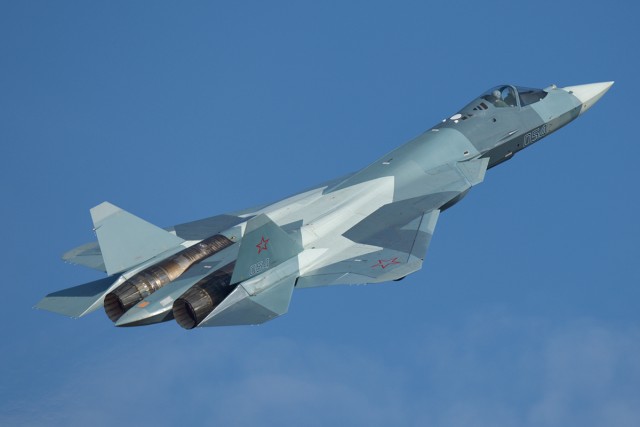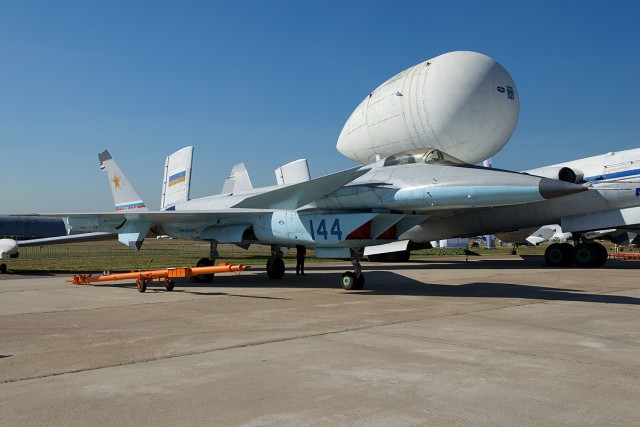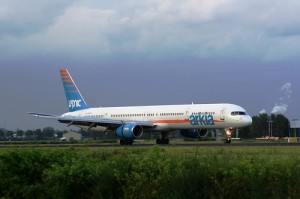
One of at least three Sukhoi T-50s climbing as part of a flight demonstration – Photo: Bernie Leighton | AirlineReporter
Every two years, the Russian government hosts the MAKS Aviasalon to showcase to the world the best and brightest of the country’s aerospace industry. I was able to attend the trade days, which are reserved for industry officials and foreign delegations to observe, try out, and negotiate sales of various aircraft, systems, and armaments in a unique environment. After three days, the business events of MAKS 2015 had concluded, and the results were pretty lackluster in terms of orders.
The show did not disappoint, however. With a large range of aircraft on static display, including examples of the Russian armed forces’ latest and greatest in their inventory, as well as multiple examples from Rostvertol, two Sukhoi Superjets, a Tupolev Tu-204C, and more, the show was sure to impress any AvGeek.

The Mikoyan MiG 1.44 technology demonstrator was displayed for the first time – Photo: Bernie Leighton | AirlineReporter
One of the highlights of the show was the public debut of three types that have never been displayed previously. These were the new navalised version of the Kamov Ka-52, the Ka-52K, and two older aircraft: The hydrogen-fueled Tupolev Tu-155, and the Mikoyan MiG 1.44.
Both of the older aircraft were a bit special. The Tu-155 was a highly-modified version of the Tu-154, with one of its engines replaced with a hydrogen-fueled experimental engine. The Mikoyan MiG 1.44 was an attempt at a fifth-generation fighter by MiG, and it only flew three or four times prior to being grounded due to funding and government disinterest in the late 1990’s.

Arkia Israeli Airlines 757-300 4X-BAW
Russia and Israel have recently had issues with authorizing flights between the two countries. On May 10th an Arkia Airlines flight with 260 Israeli passengers were not given authorization to take off from Moscow to return home to Israel.
The Arkia flight was ready to take off, when Russian clerks asked to see all the airline crew’s visas. The three pilots and six flight attendants were puzzled since Israel and Russia had signed an agreement over a year ago, stating visas were not needed. The Russian officials seemed un-phased and caused the plane to be grounded. The passengers, mostly senior citizens on a tour, had to spend the light at the Moscow airport, some with little to no money.
Arkia immediately employed the assistance of the Civil Aviation Authority and the Israeli Embassy in Moscow, but to no avail. “Although everyone agreed that it was a mistake, they just told us to come back at 8 am to solve the problem,” the airline’s deputy CEO, Nir Dagan, told Ynet. “It was unacceptable to us.”
Since normal negotiation methods were not working, the Airports Authority in Israel grounded a Trans Euro flight heading to Moscow until the Arkia flight was authorized to take off. Finally, around 4am the Russian officials gave authorization and both flights were allowed to leave.
An Israeli official said it was not the first time the Russian authorities had created difficulties for Israeli flights. “The Russians have a problem opening the Russia-Israel line for other companies as well, which hurts many Russian airlines.”
A senior airline official explained that although Russia and Israel had signed numerous bilateral agreements about the expansion of the flight options between the two countries, many Russian officials were unhappy with the large number of Israeli flights landing throughout the country because it harmed the Russian airlines.
Another roadblock is Israeli flights need to have a permit before each flight, which might not be granted until a few days beforehand. In a recent incident, an Israeli plane was forced to return to Russia after officials stated they did not have the necessary permits, but the flight did.
“We are familiar with the problem, but we don’t know whether it derives from Russian bureaucracy or whether a commercial consideration is behind it,” Tourism Ministry official Pini Shani said. “This instability is not good for tourism. We want as many Israeli and Russian airlines as possible flying between the countries. Every time there is a new flight agreement or one is expanded there are setbacks, but in the end the Russians always approve the flights at the last minute.”
Seems like a crazy political game, that is only hurting the citizens of both countries.
Source: Ynet Image: Savvas Garozis
connect | web | twitter | facebook |


